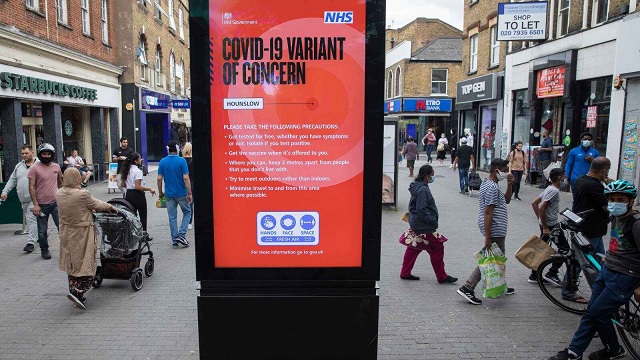
The Delta variant initially identified in India in December 2020, is the fastest and fittest coronavirus strain that will “pick off” the most vulnerable people according to the World Health Organization
Beijing, China | XINHUA | Many countries have tightened their restrictions to curb the spread of the Delta COVID-19 variant first detected in India, as the highly contagious virus has been reported in more than 90 countries and regions around the world.
The Delta variant, dominating the new infections recorded in South Africa, was the major contributor to the country’s third wave of COVID-19 pandemic, Tulio de Oliveira, director of the KwaZulu-Natal Research Innovation and Sequencing Platform, said Saturday at a press briefing.
South Africa, worst-affected nation in terms of coronavirus cases and deaths in Africa, recorded more than 15,000 new cases Sunday including 122 deaths, taking the national count of confirmed cases to 1,928,897, according to data by the National Institute for Communicable Diseases.
During a televised speech on Sunday, President Cyril Ramaphosa said his country will move to lockdown Level 4 for 14 days with stringent measures to contain the surge in cases.
From June 28 to July 11, “all gatherings whether indoors or outdoors are prohibited. These include religious, political, cultural and social gatherings. A curfew will be in place from 9 p.m. to 4 a.m., and all non-essential establishments will need to close by 8 p.m.,” he said.
Restaurants must only serve takeaways and not allow people to eat in their premises, said the president. To ease the pressure placed on hospital services by alcohol-related emergency incidents, the sale of alcohol is prohibited for both on-site and off-site consumption.
Schools will start closing from June 30, and all schools will be expected to be closed by the end of the week.
“Our priority is to break the chain of transmission by reducing person-to-person contact and thereby help flatten the curve,” said Ramaphosa. “The measures that we are putting in place now are designed to allow as much economic activity to continue as possible, while containing the spread of the virus.”
Kuwait, which announced the discovery of the first cases of the Delta COVID-19 variant on June 14, is also suffering from an increase in cases. On Sunday, the country registered 1,558 new COVID-19 cases, raising the nationwide tally to 351,481, the Kuwaiti Health Ministry reported.
Also on Sunday, Kuwait started to implement a government decision to allow only vaccinated citizens and residents to visit shopping malls, salons, gyms, and restaurants in the country.
Last week, Ahmad Al-Manfouhi, general director of Kuwait Municipality, said in a statement that armed forces of the country will join state bodies to confront the spread of coronavirus and to apply the government decision on restricting access to public venues for unvaccinated people.
Al-Manfouhi, who also heads the main committee to follow up on the implementation of health measures, said that the committee discussed on Wednesday the mechanism for implementing the government decision.
The committee decided to use the armed forces to help civilian health teams implement the decision, starting next Sunday, which is the starting date for restricting unvaccinated citizens and residents from entering restaurants, cafes, gyms, salons, and shopping malls covering more than 6,000 square meters.
Al-Manfouhi said that Kuwait needs to intensify the application of health requirements during the next two months, hoping to achieve herd immunity by increasing the percentage of vaccinated people.
Australia’s most populous state of New South Wales on Saturday reported a record daily increase of 30 locally acquired COVID-19 cases, all of which were linked to the Bondi cluster in east Sydney.
The total number of local cases in the state’s latest outbreak reached 112 since June 16, when the index case for the Bondi cluster — a driver who transported international flight crew — was reported. The driver was confirmed to be infected with the Delta variant.
The Northern Territory (NT) “is now facing its biggest threat” since the COVID-19 crisis began, Chief Minister of NT Michael Gunner said on Sunday, adding that its capital city Darwin would enter a lockdown for 48 hours.
The full lockdown was effective from local time 1:00 p.m. on Sunday at Darwin, Palmerston and Darwin rural areas, following confirmation of four new COVID-19 positive cases linked to a gold mine worker who tested positive on Friday night, according to a statement by the NT government. The virus could be the highly infectious Delta strain, according to Australian media.
During the lockdown, people living in these areas are only permitted to leave home for five reasons, including medical treatment, essential goods and services, essential work and so on. Masks must be worn if people leave their place of residence.
Other Aussie states, including the state of Western Australia and the state of South Australia, have also rolled out preventive measures to fight the pandemic.
The Delta variant, which was initially identified in India in December 2020, is the fastest and fittest coronavirus strain that will “pick off” the most vulnerable people, the World Health Organization said on June 21.
******
Xinhua
 The Independent Uganda: You get the Truth we Pay the Price
The Independent Uganda: You get the Truth we Pay the Price



